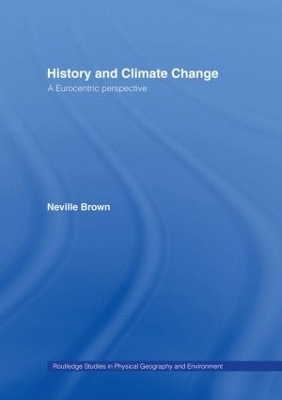
History and Climate Change
A Eurocentric Perspective
Seiten
2001
Routledge (Verlag)
978-0-415-01959-0 (ISBN)
Routledge (Verlag)
978-0-415-01959-0 (ISBN)
This book is a balanced and comprehensive overview of the links between climate and man's advance from pre-history to modern times. It is a synthesis of the many historical and scientific theories regarding man's progress through the ages
History and Climate Change is a balanced and comprehensive overview of the links between climate and man's advance from early to modern times. It draws upon demographic, economic, urban, religious and military perspectives. It is a synthesis of the many historical and scientific theories, which have arisen regarding man's progress through the ages.
Central to the book is the question of whether climate variation is a fundamental trigger mechanism from which other historical sequences develop, or one amongst a number of other factors, decisive only when a regime/society is poised for change. Evidence for prolonged climate change is not that extensive. But it is clear that climatic variation has regularly played a part in historical development. Paricular attention is here paid to Europe since AD 211.
Cold and warmth, wetness and aridity can create contrary reactions within societies, which can be interpreted in vary different ways by scholars from differenct disciplines. Does climate change exacerbate famine and epidemics? Did climate fluctuation play a part in pivotal historical events such as the mass exodus of Hsuing-nu from China, the pressure of the Huns on the Romans and the genesis of the Crusades? Did the bitter Finnish winter of 1939-40 ensure the ultimate defeat of Hitler? These episodes, and many others are discussed throughout the book in the authors distinctive style, with maps and photographs to illustrate the examples given.
History and Climate Change is a balanced and comprehensive overview of the links between climate and man's advance from early to modern times. It draws upon demographic, economic, urban, religious and military perspectives. It is a synthesis of the many historical and scientific theories, which have arisen regarding man's progress through the ages.
Central to the book is the question of whether climate variation is a fundamental trigger mechanism from which other historical sequences develop, or one amongst a number of other factors, decisive only when a regime/society is poised for change. Evidence for prolonged climate change is not that extensive. But it is clear that climatic variation has regularly played a part in historical development. Paricular attention is here paid to Europe since AD 211.
Cold and warmth, wetness and aridity can create contrary reactions within societies, which can be interpreted in vary different ways by scholars from differenct disciplines. Does climate change exacerbate famine and epidemics? Did climate fluctuation play a part in pivotal historical events such as the mass exodus of Hsuing-nu from China, the pressure of the Huns on the Romans and the genesis of the Crusades? Did the bitter Finnish winter of 1939-40 ensure the ultimate defeat of Hitler? These episodes, and many others are discussed throughout the book in the authors distinctive style, with maps and photographs to illustrate the examples given.
Neville Brown is a Professorial Associate Fellow at Mansfield College, Oxford University; and is attached to the Oxford Centre for the Environment, Ethics and Society.
The Conceptual Background
1. A Confluence of Disciplines
2. Climate Dynamics
3. Empires and Barbarians
4. Antiquity Melds
5. Northerly Engagement
6. Towards the Optimum (a) The Climate in Temperate Eurasia (b) A Germinal Century
7. The Near East in Crisis
8. How Savage a Culmination? (a) How Cruel a Sea? (b) The Mongol Horde
9. Through the Optimum
Une Longue Durée
10. Water, Warmth and Emergent Europe
11. Pointers to a Future (a) The Eurocentric World, 1492-1942 (b) Huntington or Gibbon? (c) A Gibbonesque Era (d) Translation to the Present (e) Persisting Uncertainties
| Erscheint lt. Verlag | 8.8.2001 |
|---|---|
| Reihe/Serie | Routledge Studies in Physical Geography and Environment |
| Verlagsort | London |
| Sprache | englisch |
| Maße | 174 x 246 mm |
| Gewicht | 975 g |
| Themenwelt | Geisteswissenschaften ► Geschichte |
| Naturwissenschaften ► Biologie ► Ökologie / Naturschutz | |
| Naturwissenschaften ► Geowissenschaften ► Geografie / Kartografie | |
| Naturwissenschaften ► Geowissenschaften ► Meteorologie / Klimatologie | |
| ISBN-10 | 0-415-01959-1 / 0415019591 |
| ISBN-13 | 978-0-415-01959-0 / 9780415019590 |
| Zustand | Neuware |
| Haben Sie eine Frage zum Produkt? |
Mehr entdecken
aus dem Bereich
aus dem Bereich


